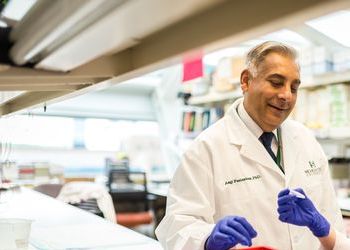Confidence: The Most Important Ingredient
The center will serve as a reliable source for information, research, training and analysis on the safe use of ingredients in consumer packaged goods including foods, beverages, cosmetics and household consumer products.

Confidence: The Most Important Ingredient
The center will serve as a reliable source for information, research, training and analysis on the safe use of ingredients in consumer packaged goods including foods, beverages, cosmetics and household consumer products.
October 6, 2014MSU scientists frequently provide a voice of reason among many voices in helping consumers, regulators, government and industry to make the best, science-based decisions possible.
Now, a new center dedicated to independent research, graduate training and communication of the state-of-the-science on the safety of ingredients is being created at Michigan State University and will help bring science to bear in decision-making related to processed foods and other goods.
The Grocery Manufacturers Association and many of its member companies have partnered with MSU to help establish the Center for Research on Ingredient Safety (CRIS). The center will serve as a reliable source for information, research, training and analysis on the safe use of ingredients in consumer packaged goods including foods, beverages, cosmetics and household consumer products.
The partnership will include the creation of the Food and Consumer Product Ingredient Safety Endowed Chair at MSU with $4 million in contributions and grants provided by the GMA and product companies.
The endowed chair faculty member will provide scientific and organizational oversight for CRIS. A national search is currently underway to recruit this initial leader who will work with the estimated 20-30 companies that are expected to provide input and ongoing financial support of nearly $1 million annually for the research and training components of the center’s agenda.
MSU successfully competed in a proposal process to host the center, citing academic expertise and a strong record of credible scientific research in toxicology, food and product safety. The university has committed to creating two additional faculty positions in this important field as part of the plan to establish CRIS.
“Michigan State University has what may be the largest and most diverse cohort of faculty in the nation working directly on food and consumer product safety issues, and the university has great strength in the discipline of toxicology,” says Fred Poston, dean of MSU’s College of Agriculture and Natural Resources. “It is natural that a center devoted to food and consumer product ingredient safety will be located at MSU.”
MSU is uniquely positioned to provide unbiased, relevant information in ingredient safety that will benefit the public, says Norb Kaminski, director of MSU’s Center for Integrative Toxicology.
“Our work is rigorously reviewed by the scientific community, both on campus and throughout the world as we share and publish research approaches and findings,” Kaminski says.“Our goal is to apply the best and most current science to the complex biological and toxicological issues surrounding food and ingredient safety.”
CRIS will be modeled after existing, successful centers of expertise at other academic institutions. An advisory board composed of multiple stakeholders, including academic, industry, non-governmental organizations and regulatory representatives will govern the center.
“Ensuring the safety of our products – and maintaining the confidence of consumers – is the single most important goal of our industry,” says GMA’s Chief Science Officer Leon Bruner. “We are very pleased to be part of the founding of the Center for Research on Ingredient Safety. The center will be an independent resource for a broad range of stakeholders that provides analysis and information on the safety of ingredients used in foods and consumer products.”
CRIS will work to expand the opportunity to conduct basic and applied research and to develop and validate the testing methods and strategies for evaluating the safety of ingredients in food, packaging, cosmetics and household care products. The center will also be expected to establish a graduate training program that prepares scientists for a career iningredient safety and to share research findings widely.
Also participating in the endeavor is the University of Michigan Risk Science Center (RSC). The RSC will lead the communications component by developing innovative approaches to connecting the CRIS research with stakeholders. In addition,CRIS and RSC will provide responsive and evidence-informed risk/benefit insights into topical issues on food ingredient safety.
“Partnerships, like the one that creates the Food and Consumer Product Ingredient Safety Endowed Chair with the GMA and its members, show that safe and secure food and consumer products truly change the world,” says Fred Derksen, chairperson of MSU’s Department of Food Science and Human Nutrition. “In addition to the support of the endowed chair, MSU is committed to establishing this center whose core is research, educating the next generation of scientists, informing regulators and serving the public.”
For more information on supporting CRIS, contact Associate Director of Development Megan Hirschman at hirschm8@msu.edu or by calling (517) 353-5507.




